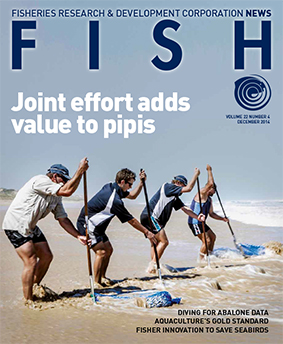 Back to FISH magazine
Back to FISH magazine
FISH is the official newsletter of the Fisheries Research & Development Corporation. It is published quarterly in March, June, September and December. The hard copy version is distributed widely throughout the industry via direct mail. To obtain a hard copy of "FISH", please fill in your details on the FRDC subscribe form towards the footer of this page. Information may be reproduced freely as long as it is not for commercial benefit and FRDC's FISH © is acknowledged as the source. Otherwise, reproduction is forbidden without written prior permission of FRDC. FRDC is always happy to receive feedback and story suggestions. Please send these to the Communications Team.
In this issue
A common approach defines sustainable fishing
A year of listening, debating and discussing has paved the way to a new definition of sustainability for Australia’s wild-catch seafood

Underwater contagion control
A fascination with the forces that allow pests and pathogens to flourish, threatening our aquatic industries, drives Marty Deveney’s research into better biosecurity measures

Market makeover for Australian Salmon
Atlantic Salmon may soon have a challenger in the form of a native namesake that is the focus of new initiatives from harvesting to product development By Rose...

Economics 101 transforms pipi fishery
A simple mathematical tool used in agriculture and manufacturing is improving the way the South Australian Pipi Fishery is managed, and optimising its value

Listening: an essential first step
Talking to industry members about what they want from a seafood marketing program is a vital part of ensuring it delivers By Peter Horvat The FRDC is bringing...

Native gastropod a new candidate for aquaculture
A tasty local sea snail that can be milked for anti-tumour compounds, anaesthetics and other biologically active chemicals is causing excitement among South Australian aquaculture...

Go for gold in Sydney
Prestige, premium prices and even state bragging rights are some of the benefits that come with gold medal status for aquaculture producers taking part in the Sydney Royal Fine Food...

Small size, big role
Understanding the place of small pelagic fish within the larger food chain is a crucial part of managing these highly variable fish stocks

Autumn tops abalone weigh-in
The desire to target Greenlip Abalone at their peak weight could lead to significant changes in the timing of harvest for the South Australian fishery, benefiting both abalone populations and...

Indigenous rangers boost regional research capability
By drawing on a unique blend of theoretical, practical and local knowledge, an Indigenous marine ranger training program is boosting research capability in northern Australia

In brief
Award for recovered waste

The pointy end of strategy planning
The next iterations of the National Fishing and Aquaculture RD&E Strategy and the FRDC’s RD&E Plan are progressing Valuable input has been received from stakeholders for the...

Innovative thinking to keep birds at bay
Whether they use colour, water, movement or noise, fishers are working to develop new options to keep seabirds at a safe distance from their vessels

Seeing is believing
New deepwater camera technology has huge potential to help fishers and fisheries managers by revealing the effectiveness of fishing gear and its effects on the seafloor, allowing for changes to...

Technology enhances recreational endeavours
Advanced technologies are helping recreational fishers more accurately target their preferred catch, while reducing the environmental effects of their activities By Natasha...

Grassroot actions earn OceanWatch stewardship role
A favourite organisation with fishers has been asked to serve as the marine environment Natural Resource Management agency By Gio Braidotti

Industry toolkit focuses on communication
Storybooks, recipes, videos and infographics are all part of the mix industry leaders are using to share the story of fishing and seafood

Whale watch for Rock Lobster fishers
The rise in whale numbers along Western Australia’s coast has prompted new research to reduce the risk of entanglements in fishing gear

Diver data drives improved abalone management
Australia and New Zealand’s abalone industries have distinct cultural and operational differences, but a shared need for better information is bringing closer collaboration

Oyster farmers tap American know-how
Technology that accelerates the growth of juvenile shellfish proved a popular workshop subject when US expert Dale Leavitt met with Australian oyster growers






